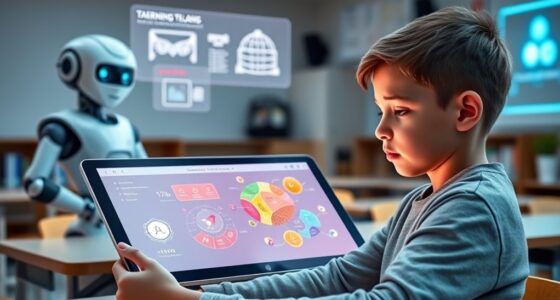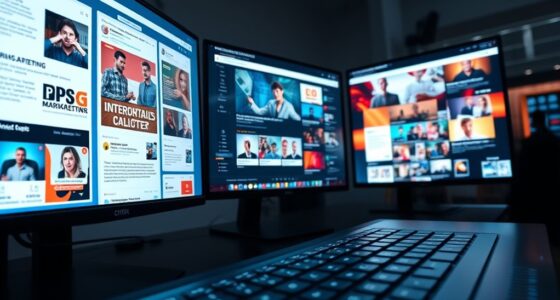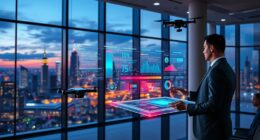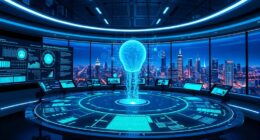Generative AI's ability to create blockbuster movies from just a single sentence is changing the game. You'll see production times and costs slashed, potentially leaving traditional directors feeling obsolete. Independent filmmakers gain access to tools once reserved for major studios, democratizing the industry. However, this shift raises concerns around storytelling depth and originality, as AI may favor formulaic narratives. Job security for directors, writers, and editors is also at risk as automation takes center stage. There's much more to unpack about the impact of AI on filmmaking, so stick around to explore this evolving landscape.
Key Takeaways
- Generative AI tools can rapidly create high-quality movie content, challenging traditional roles of directors in the filmmaking process.
- The automation of storytelling tasks may lead to job displacement for directors, writers, and editors in the industry.
- AI's reliance on data analytics tends to produce formulaic narratives, raising concerns about originality and creative storytelling.
- While AI can streamline production, it may undermine the nuanced vision that human directors bring to filmmaking.
AI Revolutionizes Filmmaking Industry
As you step into the world of filmmaking, you're likely to notice a seismic shift in the way movies are being made, with generative AI tools poised to revolutionize the industry in ways that promise to be nothing short of transformative.
With AI technology, the filmmaking process is becoming faster and more efficient, allowing for rapid content creation and reducing production costs. For instance, AI can generate movie trailers in just seven hours, greatly speeding up the ideation and production process.
Additionally, AI-powered filmmaking tools are democratizing access to high-quality production, enabling independent creators to compete with established studios and potentially reshaping storytelling approaches. Major entertainment companies, such as Disney, are already exploring AI's potential in film production, indicating a shift towards incorporating AI to increase efficiency and reduce costs.
As AI-generated content continues to grow, it's clear that generative video is set to play a major role in the future of filmmaking, revolutionizing the industry in ways that will be nothing short of remarkable.
Financial Implications of AI Films

With production costs for blockbuster films often soaring into the hundreds of millions of dollars, the financial implications of integrating generative AI into the filmmaking process are too significant to ignore.
You're likely aware that traditional filmmaking comes with massive financial risks, with production costs ranging from $200 million to $300 million, and marketing expenses often matching that amount.
However, generative AI is predicted to drastically reduce production costs, potentially lowering animation costs from $200 million to as little as $20 million. This makes high-quality film production more accessible and cost-efficient.
The economic implications of AI in filmmaking are clear: studios can achieve higher profit margins due to cost savings from AI integration in the production process.
Tyler Perry's decision to cancel an $800 million studio build-out reflects a strategic shift towards cost efficiency influenced by advancements in AI technology within the film industry.
As you consider the role of AI-generated content in filmmaking, it's crucial to recognize the significant financial implications and the potential for increased profitability.
Ethical Concerns of AI Actors

You're about to enter a gray area where AI-generated actors can replicate real people's likenesses without their consent, sparking heated debates about personal autonomy and representation in media. This raises significant ethical concerns, as AI actors can manipulate and generate performances, potentially leading to unwanted promotions or associations for individuals whose likenesses are used without their permission.
| Concerns | Implications |
|---|---|
| Personal Autonomy | Unauthorized use of likenesses without consent |
| Fair Remuneration | Minimal compensation for actors' likenesses and voices |
| Representation | Misrepresentation or manipulation of individuals' images |
As you explore further, you'll realize that creators must understand contracts and rights related to AI-generated content to avoid the risks of unauthorized use and ethical implications. The popularity of AI-generated content, such as a video ad featuring an AI actor receiving 723 retweets, highlights the acceptance of AI in entertainment but also underscores the potential for exploitation. It's crucial to address these ethical concerns to guarantee that AI actors are used responsibly and respectfully, without compromising individuals' personal autonomy or rights.
Impact on Superhero Films Storytelling

As you consider the impact of generative AI on superhero films, you'll notice that the genre's reliance on formulaic storytelling is becoming more pronounced.
You're likely to see predictable hero arcs and character developments that feel familiar, but lack originality.
The question is, will AI-generated content exacerbate these concerns, or can filmmakers find ways to innovate within the constraints of AI-driven production?
Predictable Hero Arcs
Superhero films' reliance on formulaic hero arcs has led to a sense of déjà vu, where audiences can anticipate every twist and turn, craving something more from the genre beyond its tired, predictable tropes. As you watch your favorite heroes save the world, you can't help but feel like you've seen it all before. This is because these films often follow a predetermined structure, prioritizing replication over originality.
The integration of AI in filmmaking raises concerns that it may exacerbate this issue, favoring data-driven decisions that reinforce existing trends rather than fostering new ideas. You're not alone in feeling fatigued by the predictable hero arcs. Historical data analysis by tools like Cinelytics shows that superhero films frequently employ similar action sequences and character developments, limiting creative exploration within the genre.
The use of generative AI may further homogenize narratives, making it even more challenging to create unique and engaging stories. As a result, you're left craving something more from the genre, something that breaks free from the predictable hero arcs and offers a fresh perspective.
Formulaic Storytelling Concerns
Formulaic storytelling concerns in superhero films are escalating, driven by the industry's reliance on data analytics and predictable narrative structures that prioritize box office success over innovative storytelling.
As you watch the latest superhero blockbuster, you can't help but feel a sense of déjà vu. The hero's journey, the villain's motives, and the plot twists all seem familiar, lacking the originality that once made superhero films so exciting.
Here are three reasons why formulaic storytelling is stifling creativity in superhero films:
- Data-driven decisions: The use of data analytics tools, such as Cinelytics, is leading to a homogenization of content, resulting in repetitive themes and diminishing creative diversity.
- Lack of risk-taking: Filmmakers are prioritizing box office success over innovative storytelling, resulting in a stagnation of creativity and a reliance on familiar formulas.
- AI tools reinforcing formulas: As AI tools become more integrated into filmmaking, there's concern that they may reinforce existing formulas, further constraining the narrative possibilities and originality in superhero films.
The integration of AI tools in filmmaking raises questions about the future of original work in superhero films.
Will AI-generated content further perpetuate formulaic storytelling, or can it be used to break free from these constraints and create something truly original?
AI-Generated Plot Holes
You're likely to notice that AI-generated plots in superhero films often fall short regarding narrative coherence, leading to glaring plot holes that detract from the viewing experience.
These generative models may excel at producing exciting action sequences, but they struggle to craft a cohesive story with well-developed characters. As a result, you might find yourself questioning the motivations behind a character's actions or wondering why a particular plot twist doesn't make sense. Unfortunately, these plot holes are all too common in AI-generated superhero films, which can undermine the emotional engagement and narrative impact that audiences expect from these movies.
The creative potential of AI in filmmaking is undeniable, but it's crucial to acknowledge its limitations. Relying too heavily on AI-generated content can lead to formulaic storytelling and a lack of originality, which can be detrimental to the superhero genre.
To avoid this, filmmakers must strike a balance between leveraging AI's capabilities and injecting creative, human insight into the storytelling process. By doing so, they can craft engaging, coherent narratives that resonate with audiences and leave a lasting impact.
Disney's Initiatives in AI Filmmaking
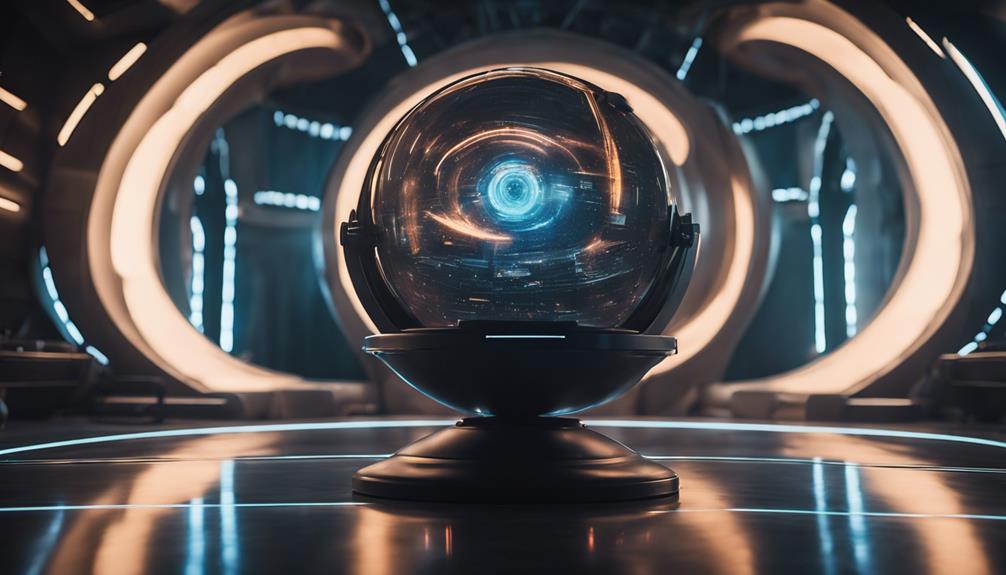
You're about to plunge into the exciting world of Disney's AI filmmaking initiatives. Disney is proactively driving innovation in filmmaking by establishing a dedicated task force to tap into the vast potential of AI in film production. This move reflects the company's commitment to embracing cutting-edge technology to enhance efficiency, reduce costs, and revolutionize the creative process.
Here are three key aspects of Disney's AI filmmaking strategy:
- Streamlining workflows: Disney is experimenting with generative AI tools to automate repetitive tasks, freeing up human creatives to focus on high-value tasks.
- AI-driven insights: The company is leveraging AI to inform project development and audience engagement strategies, potentially transforming traditional storytelling methods.
- Balancing innovation with ethics: Disney is ensuring that its use of AI aligns with its creative values, emphasizing that AI should enhance, not replace, human creativity in filmmaking.
As AI is likely to play an increasingly prominent role in the Creative Industries, Disney's initiatives are paving the way for a future of storytelling that's more efficient, innovative, and engaging. By harnessing the power of AI, Disney is shaping the future of filmmaking and redefining the boundaries of what's possible.
Future of Creative Industries

As Disney paves the way for a future of efficient and innovative filmmaking, the implications of AI's influence extend far beyond the boundaries of the entertainment giant, threatening to upend traditional norms in the creative industries. You're likely wondering what this means for the future of creative industries. The emergence of generative AI is poised to democratize filmmaking, allowing a broader range of creators to produce high-quality content without the constraints of traditional studio systems.
| Industry Impact | AI's Role | Human Role |
|---|---|---|
| Film Industry | Content ideation, production, and editing | Creative Direction, oversight, and quality control |
| Music Industry | Composition, production, and sound design | Artistic vision, emotional resonance, and human touch |
| Publishing Industry | Content generation, editing, and research | Editorial oversight, fact-checking, and nuance |
As AI continues to advance, you'll need to reflect on the evolving roles of filmmakers, including the potential for job displacement alongside new opportunities for collaboration between humans and AI. The integration of AI into creative processes raises important ethical considerations regarding authorship, copyright, and the quality of creative output. You'll need to stay ahead of the curve to navigate the future of creative industries.
AI in Hollywood's Creative Process

In a groundbreaking shift, AI is revolutionizing Hollywood's creative process by slashing production timelines and amplifying collaboration, with Disney at the forefront of this transformative movement.
You're witnessing a new era where artificial intelligence is being used to create new content, from movie trailers to entire films. The possibilities are endless, and the results are astounding.
Here are three ways AI is changing the game:
- Faster ideation and content creation: AI tools are allowing filmmakers to narrow the gap between inspiration and execution, reducing production timelines and increasing efficiency.
- Enhanced collaboration: AI technologies are empowering creators to maintain their original ideas throughout the production pipeline, while enhancing collaboration and innovation.
- New forms of storytelling: Using AI, filmmakers can now experiment with new formats and styles, pushing the boundaries of what's possible in storytelling.
As AI-generated content becomes more prevalent, you can expect to see a significant shift in the way movies are made. With Disney leading the charge, it's clear that AI is here to stay in Hollywood's creative process.
Employment and Industry Shifts

The rise of generative AI in filmmaking is poised to disrupt traditional employment structures, threatening to automate key creative roles and fundamentally alter the industry's dynamics.
As you navigate this shifting landscape, you'll likely wonder what this means for your job and the future of creative industries. The answer is unsettling: job displacement is a real concern.
With AI capable of streamlining processes and reducing costs, traditional roles like directors, writers, and editors may become obsolete. A Goldman Sachs report estimates that 25% of work tasks in the US and Europe could be automated by generative AI, with administration and legal professions being particularly susceptible.
This automation raises concerns about the future demand for original content creation skills. As AI-generated content becomes more prevalent, you may find yourself competing with machines for work.
The industry is already responding, with the Hollywood writers' strike highlighting concerns over job security and compensation related to AI.
As you adapt to this new reality, you'll need to contemplate how automation will impact your role and the industry as a whole.
Cultural Impact of AI Filmmaking

You're about to witness a seismic shift in the way stories are told, as generative AI filmmaking threatens to upend traditional narrative structures and challenge the very essence of cultural authenticity in cinema.
With AI's ability to analyze vast amounts of data, the focus of storytelling may shift from creative expression to formulaic approaches driven by market analytics. This raises concerns about the dilution of cultural narratives and the homogenization of content, as AI tends to favor replicating successful formulas.
However, the democratization of filmmaking through AI tools could also allow diverse voices and narratives to emerge, offering opportunities for independent creators to challenge Hollywood norms and broaden cultural representation.
Here are three key implications of AI filmmaking on cultural impact:
- Generative AI may lead to a loss of cultural authenticity in cinema, as AI-generated content lacks the depth and nuance of human-created narratives.
- The increased use of AI in filmmaking raises ethical considerations, such as the potential homogenization of content and the decline of traditional narrative structures.
- On the other hand, AI tools could enable diverse voices to emerge, promoting a more inclusive and representative cinematic landscape.
Frequently Asked Questions
Will AI Replace Movie Directors?
You're wondering if AI will replace movie directors, but the answer is no – AI can assist with tasks, but it can't replicate the creative vision, emotional understanding, and leadership skills that a human director brings to a film.
What Movie Was Made Entirely by Ai?
"When in Rome, do as the Romans do" – you're wondering what movie was made entirely by AI. Well, you're in luck! The answer is "Zone of Interest", a feature film that premiered at Cannes in 2023, showcasing AI's potential in filmmaking.
What Was the First Fully Ai-Generated Movie?
You're wondering what the first fully AI-generated movie is? Well, it's "The Last Movie", created by ScriptAI from a single sentence prompt, marking a milestone in AI's integration into the film industry in 2023.
Is Hollywood Going to Use Ai?
You're wondering if Hollywood will use AI? Yes, they're already exploring it to streamline production, enhance efficiency, and reduce costs, but human creativity and directors are still essential in the storytelling process.
Will AI Replace Human Creativity in the Entertainment Industry?
Many wonder if ai composes symphony outranks mozart, could it replace human creativity in the entertainment industry. While AI is making strides in generating music and art, human creativity brings emotional depth and uniqueness that AI cannot replicate. It’s unlikely that AI will fully replace human creativity in entertainment.
Conclusion
As generative AI reshapes the filmmaking landscape, it raises questions about the future of creativity in Hollywood.
Will directors become obsolete, or can they find new ways to collaborate with AI?
The financial implications, ethical concerns, and cultural shifts all highlight the need for a balance between technology and human artistry.
Embracing this change could lead to innovative storytelling, but it's essential to guarantee that the heart of filmmaking remains intact.
What role will you play in this evolving narrative?


